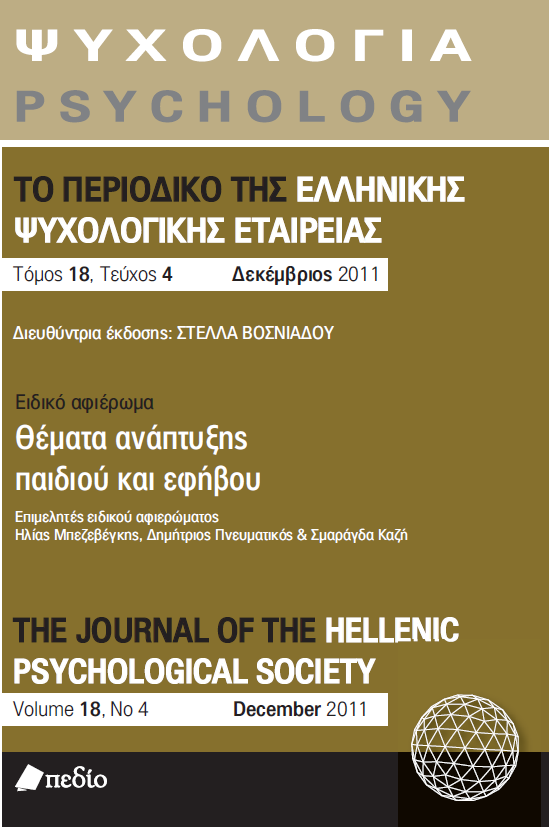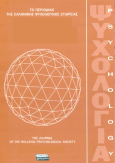Πολιτικός προσανατολισμός, πολιτική σκέψη και κοινωνικο-ηθική κρίση: Βίοι παράλληλοι;

Περίληψη
Στο παρόν άρθρο επιχειρείται η επισκόπηση των κυριότερων ερευνών και των συνακόλουθων ερμηνειών της σχέσης μεταξύ της πολιτικής ιδεολογίας και της ανάπτυξης της κοινωνικο-ηθικής σκέψης, όπως αυτή εξειδικεύεται στη θεωρία του L. Kohlberg. Οι σημαντικότερες έρευνες έδειξαν ότι η ποιοτική διαφοροποίηση των κατά στάδια δομών της
κοινωνικο-ηθικής κρίσης εντάσσεται στους προσδιοριστικούς παράγοντες διαμόρφωσης των πολιτικών πεποιθήσεων ή του πολιτικού προσανατολισμού. Παλαιότερα και νεότερα ευρήματα συγκλίνουν στη διαπίστωση ότι το συμβατικό επίπεδο σκέψης συνδέεται με το συντηρητικό πολιτικό προσανατολισμό, σε αντίθεση με το μετασυμβατικό επίπεδο και πιο συγκεκριμένα με το στάδιο 5 της εξελικτικής ακολουθίας, που εντοπίστηκε σε υψηλότερα ποσοστά σε άτομα που υιοθετούν την ευρέως εννοούμενη αριστερή ιδεολογία. Η ερμηνεία της πιο πάνω αντιστοιχίας εξακολουθεί να παραμένει σημείο αντιλεγόμενο. Στην παρούσα εργασία παρουσιάζονται επίσης τα ευρήματα μιας έρευνας που πραγματοποιήθηκε στον ελλαδικό χώρο, η οποία μελέτησε τη σύνδεση ανάμεσα στην εξέλιξη της πολιτικής σκέψης και την ανάπτυξη της κοι-
νωνικο-ηθικής κρίσης σε ευρύ φάσμα υποκειμένων ηλικίας 10 έως 18 ετών. Η διερεύνηση της σύνδεσης μεταξύ του εξελικτικού προτύπου κατανόησης πολιτικών εννοιών και του επιπέδου της κοινωνικο-ηθικής σκέψης σε κάθε ομάδα ηλικίας αποκάλυψε κάποιες στατιστικά σημαντικές συνδέσεις, οι οποίες αφορούσαν την κατανόηση της κυβέρνησης και του νόμου στα 12 έως 15 έτη, και της εξουσίας στα 15 έως 18 έτη, ενώ δεν παρατηρήθηκαν στατιστικά σημαντικές συνδέσεις στην ομάδα του δημοτικού σχολείου.
Λεπτομέρειες άρθρου
- Πώς να δημιουργήσετε Αναφορές
-
Φωτακοπούλου Ό., & Μαρκουλής Δ. (2020). Πολιτικός προσανατολισμός, πολιτική σκέψη και κοινωνικο-ηθική κρίση: Βίοι παράλληλοι;. Ψυχολογία: το περιοδικό της Ελληνικής Ψυχολογικής Εταιρείας, 18(4), 440–467. https://doi.org/10.12681/psy_hps.23732
- Τεύχος
- Τόμ. 18 Αρ. 4 (2011)
- Ενότητα
- ΕΙΔΙΚΟ ΑΦΙΕΡΩΜΑ

Αυτή η εργασία είναι αδειοδοτημένη υπό το Creative Commons Attribution-ShareAlike 4.0 International License.
Το περιοδικό ΨΥΧΟΛΟΓΙΑ έχει υιοθετήσει μία πολιτική Platinum open-access. Τα έξοδα υποβολής, επεξεργασίας ή δημοσίευσης των εργασιών καλύπτονται από την Ελληνική Ψυχολογική Εταιρεία. Τα πνευματικά δικαιώματα των δημοσιευμένων εργασιών προστατεύονται από την άδεια 'Creative Commons Attribution-ShareAlike 4.0 International'. Οι Συγγραφείς διατηρούν τα Πνευματικά Δικαιώματα και χορηγούν στο περιοδικό το δικαίωμα της πρώτης δημοσίευσης. Η άδεια αυτή επιτρέπει σε τρίτους, να χρησιμοποιούν την εργασία σε οποιαδήποτε μορφή, με την προϋπόθεση της διατήρησης των διατυπώσεων που προβλέπονται στην άδεια σχετικά με την αναφορά στον αρχικό δημιουργό και την αρχική δημοσίευση στο περιοδικό ΨΥΧΟΛΟΓΙΑ. Επιπλέον, κάθε διανομή της εργασίας οφείλει να γίνεται με τους ίδιους όρους διανομής, δηλαδή με την ίδια άδεια Creative Commons.



